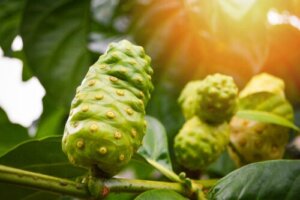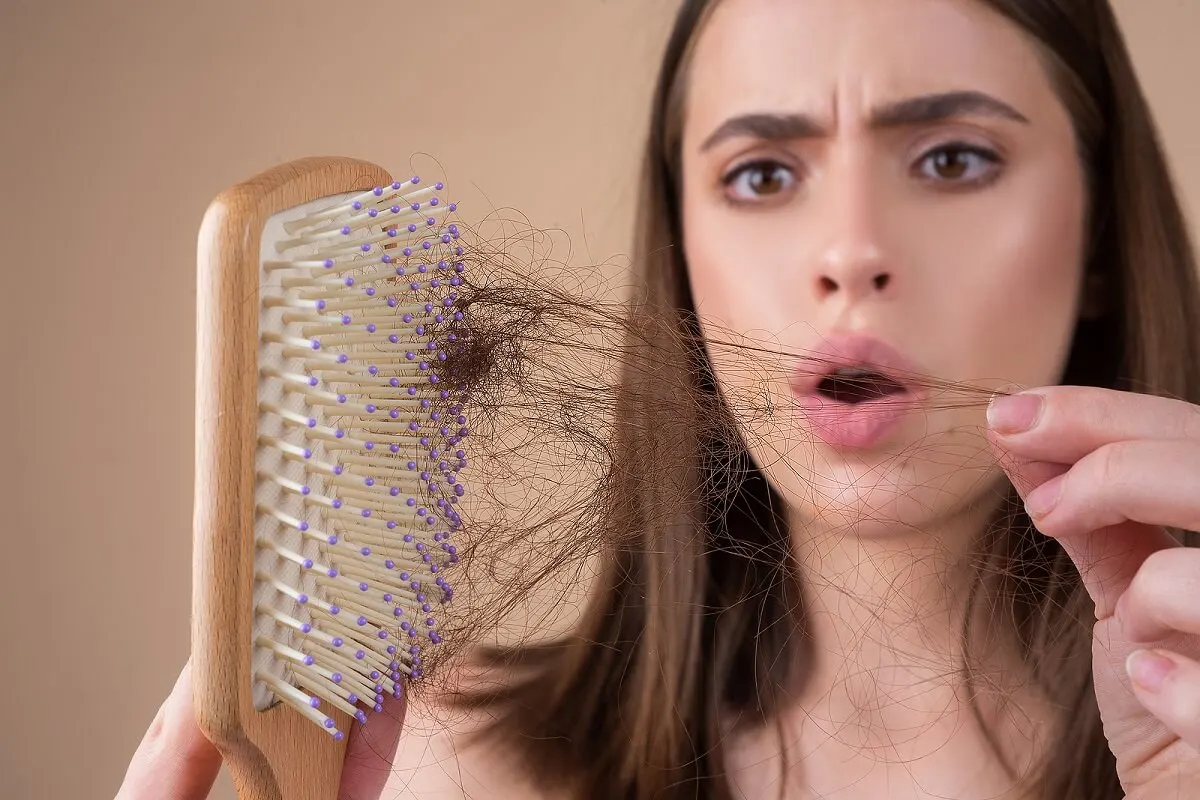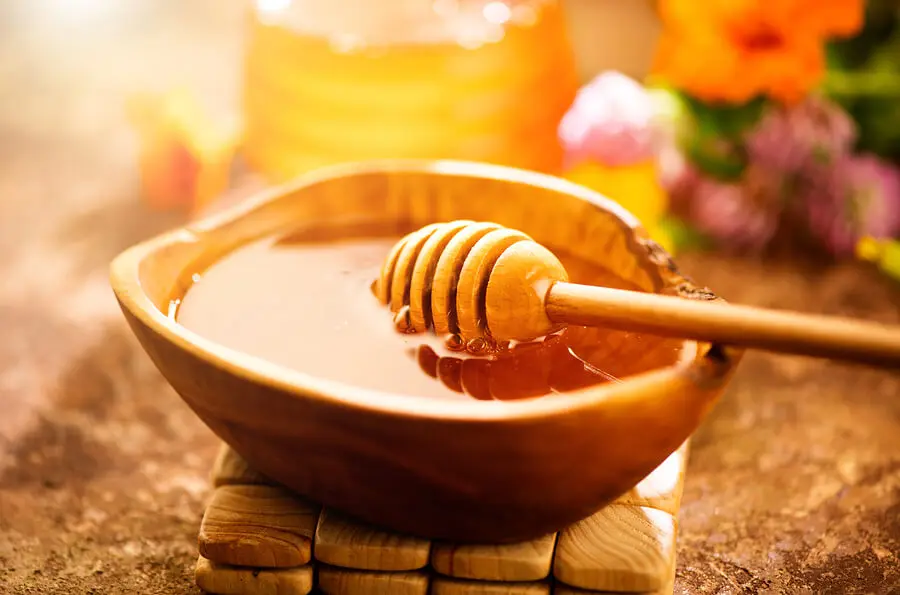Noni for Hair: Does It Work to Stop Excessive Hair Loss?

The popularity of noni for hair has spread in recent years. This tropical fruit, whose scientific name is Morinda citrifolia, concentrates phytochemicals that are associated with positive effects on hair health. Specifically, it supports healthy hair growth and dandruff control.
In fact, its extracts are now being used in the manufacturing of shampoos. In addition, there are those who use it in its natural form in combination with other ingredients. Do you want to know more about it? Read on!
The nutritional composition of noni
Before taking a closer look at all of the benefits of noni for hair, it’s worth mentioning its nutritional composition, which is linked to many of its benefits. In fact, as detailed in an article in the magazine Nutrients, the fruit is composed of 90% water and 10% dry matter.
Specifically, it concentrates the following nutrients:
- Dietary fiber
- Protein and amino acids, such as glutamic acid, aspartic acid and isoleucine
- Reducing sugars (glucose and fructose)
- Minerals, such as calcium, sulfur, potassium, magnesium, sodium and phosphorus
- Vitamins A, B, and C
Now, the same source highlights the interesting chemical composition of this ingredient. It’s estimated to have 200 compounds, including flavonoids, anthraquinones, organic acids, alcohols, carotenoids, and lignans, among others.
We think you may also enjoy reading this article: 13 Makeup and Hairstyle Tricks to Save Time in the Mornings
The benefits of noni for hair
For a long time, noni has been used as a hair care supplement. Both its consumption and its use in external treatments appear to have positive effects on hair health.
However, many of the benefits attributed to it are not supported by evidence. For the most part, they’re based on anecdotal data. Does it work against excessive hair loss? We’ll take a closer look at this and other possible effects.

Noni to stop excessive hair loss
Excessive hair loss can have its origin in multiple causes. Genetics, hormonal fluctuations, nutritional deficits, and stress are some of the most common triggers. That said, it should be clear that noni does not have the superpower to stop this loss. Even so, its consumption can be beneficial.
Given its concentration of vitamins, minerals and antioxidant compounds, the intake of its juice contributes to a good capillary health. As a review published in Dermatologic Therapy states, these micronutrients are relevant elements for the normal cycle of the hair follicle and for cell renewal.
There’s no evidence that topical application of noni juice relieves excessive hair loss. Despite this, some people still decide to try it.
It can promote dandruff control
Another interesting benefit of noni for hair has to do with dandruff control. Its concentration of antifungal compounds helps to fight the fungi that cause this hair problem. It also helps relieve irritation, itching, and burning sensation.
In this regard, a study shared in the Journal of Pharmacy and Bioallied Sciences found that a combination of noni fruit extract and pandan leaf extract exhibited potential as an anti-dandruff shampoo. In particular, it was useful in inhibiting the growth of isolated dandruff bacteria.
It helps to moisturize hair
One of the nutrients contained in noni, biotin, is positively associated with hair health. Although research indicates that there is not enough evidence to support its effects on hair growth and alopecia control, it has been found to act positively on conditions such as pathological brittle hair syndrome (trichoclasia).
Similarly, apart from biotin, noni contains other nutrients that strengthen, nourish and moisturize your hair. Thus, its consumption and the application of topical treatments would be useful to combat dry and dehydrated hair.
Noni favors the elimination of lice
Noni shampoo and hair products are used in folk medicine as a remedy to combat lice. Its antimicrobial and anti-inflammatory properties are believed to be behind these effects. However, there are still no studies that prove its efficacy.
In a publication by Dr. Steve Best, a combination of noni juice with conditioner is suggested to facilitate the elimination of these small insects. Ideally, the treatment should be left on the hair for several hours to take effect. Then, with a comb, proceed to remove the lice.
Is it safe to use noni on your hair?
The application of shampoos and treatments formulated with noni is usually safe for most people. However, home remedies using the juice of this fruit should be used with caution. While they’re usually harmless, some may cause irritation or itching of the scalp.
Therefore, before applying noni juice to the hair, it’s a good idea to test a small area. If after a couple of hours there are no negative reactions, it can be used without problem. On the contrary, if there’s irritation or itching, it’s necessary to rinse with abundant water and avoid its use.
As for the direct consumption of the juice or of the fruit, it’s necessary to bear in mind that it must be moderate. An excessive intake is linked to the following side effects:
- Diarrhea (due to its laxative effect)
- Hepatic failure
- High levels of potassium in the blood
We think you may like to read this article, too: 4 Reasons Why You Might Get Gray Hairs When You’re Young
A home remedy with noni for your hair
If after doing the sensitivity test there are no negative reactions, it’s possible to apply a home remedy with noni for hair. Its preparation is simple and can be applied 2 or 3 times a week.
Ingredients
- 1 large ripe noni
- 1 tablespoon of brewer’s yeast (15 grams)
- 2 tablespoons of honey (30 grams)

Instructions
- To begin, peel the noni and cut it into small pieces.
- Then, process it in a blender or crush it with a fork.
- Then, mix it with the yeast and honey until you get a homogeneous paste.
- Wet your hair and apply the treatment from roots to ends.
- Leave on for 20 to 30 minutes.
- Rinse with cold water.
What to remember about noni for hair health
Because of its abundant content of micronutrients and antioxidants, the consumption of noni can contribute to good hair health. However, there are no studies that demonstrate its efficacy against excessive hair loss, lice, or other hair problems. These benefits come from anecdotal evidence.
However, it is possible to find noni hair treatments and products on the market. These are usually the best options to test its properties.
To try it with homemade preparations, it’s necessary to do a sensitivity test in order to avoid unwanted reactions. So, are you going to give it a try?
All cited sources were thoroughly reviewed by our team to ensure their quality, reliability, currency, and validity. The bibliography of this article was considered reliable and of academic or scientific accuracy.
- Inada AC, Figueiredo PS, Santos-Eichler RAD, Freitas KC, Hiane PA, Castro AP, Guimarães RCA. Morinda citrifolia Linn. (Noni) and Its Potential in Obesity-Related Metabolic Dysfunction. Nutrients. 2017 May 25;9(6):540. doi: 10.3390/nu9060540. PMID: 28587078; PMCID: PMC5490519.
- Phillips TG, Slomiany WP, Allison R. Hair Loss: Common Causes and Treatment. Am Fam Physician. 2017 Sep 15;96(6):371-378. PMID: 28925637.
- Almohanna HM, Ahmed AA, Tsatalis JP, Tosti A. The Role of Vitamins and Minerals in Hair Loss: A Review. Dermatol Ther (Heidelb). 2019 Mar;9(1):51-70. doi: 10.1007/s13555-018-0278-6. Epub 2018 Dec 13. PMID: 30547302; PMCID: PMC6380979.
- Bistas KG, Tadi P. Biotin. [Updated 2022 Jul 4]. In: StatPearls [Internet]. Treasure Island (FL): StatPearls Publishing; 2022 Jan-. Available from: https://www.ncbi.nlm.nih.gov/books/NBK554493/
- LiverTox: Clinical and Research Information on Drug-Induced Liver Injury [Internet]. Bethesda (MD): National Institute of Diabetes and Digestive and Kidney Diseases; 2012-. Noni. [Updated 2020 Mar 28]. Available from: https://www.ncbi.nlm.nih.gov/books/NBK548374/
This text is provided for informational purposes only and does not replace consultation with a professional. If in doubt, consult your specialist.








